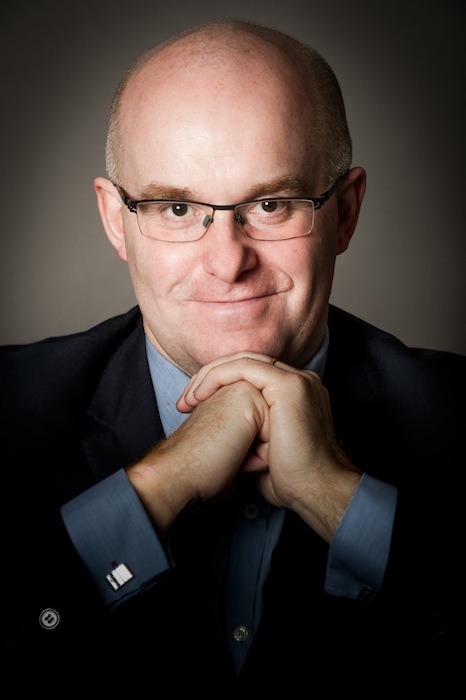Cummings, NSO serve up a fresh take on Handel’s “Messiah”

Laurence Cummings conducted the National Symphony Orchestra in Handel’s “Messiah” Thursday night. Photo: Robert Workman
The incontrovertible signs of the end of the year are upon us. People are stringing lights and decorations, buying presents at a feverish pace, and attending far too many holiday parties. The poinsettias were under the tree in the Kennedy Center Concert Hall on Thursday night, as the National Symphony Orchestra continued its annual tradition of performing Handel’s Messiah.
While the NSO performs the same piece year after year, routine is avoided by doing it a bit differently each December. This year the honor fell to Laurence Cummings, music director of the Göttingen International Handel Festival and the London Handel Festival. He brought an easy authority to the score, conducting from one of the two harpsichords in the orchestra, augmented nicely by portative organ in the larger pieces. A small ensemble of around twenty string players played mostly without vibrato. In the hall’s vast acoustic it was a sound that never overwhelmed the ears and often required one to lean in and listen carefully.
Soprano Joélle Harvey, heard in Washington Concert Opera’s La Favorite last spring, was the best of the quartet of soloists. Her tone was small but pure and airy at the top, so that she could easily float soft high notes. The series of dramatic pieces at the birth of Christ were dramatic and exciting, and she took the runs in “Rejoice greatly” at a fluttering, rapid pace. Harvey’s performance of the often-cut aria “If God be for us” was the high point of the evening. The serene calm of Harvey’s voice, interwoven with the lithe violin solo by concertmaster Nurit Bar-Josef, made this a lovely moment of repose.
Cummings had the University of Maryland Concert Choir for the ensemble numbers, which are the backbone of this oratorio. Well prepared by director Edward Maclary and augmented by a few professional stringers, they gave an intense rendition of their numbers, with the alto section standing out for the beauty of their sound. Cummings applied articulation rigorously to their parts to bring out the leading motifs in each chorus. Cummings cut eight numbers from the second and third parts, including reducing the Pifa to just a few bars, played in a way that recalled its association with the pastoral bagpipe.
James Kryshak was convincing in the tenor arias albeit singing them with a rather anodyne voice. Intonation was not always on target, and he had a moment of confusion about the text in his opening recitative, “Comfort ye.” Bass-baritone Douglas Williams lacked power at the bottom of his range, and the top of some of the pieces, like “The trumpet shall sound” souned effortful.
Countertenor Christopher Ainslie was the most adventurous in terms of ornamenting his part, and his occasional cadenzas at the end of arias kept listeners on their toes. Handel did create some of the arias for male altos at the first Dublin performance, but some of the signature pieces require the distinctive timbre of a low woman’s voice. For example, Ainslie did not do justice to “He was despised.” ![]()
In an interview Cummings has spoken of being taken by Christopher Hogwood’s arresting, period-instruments recording of Messiah when he was young. Like Hogwood, Cummings emphasized the more operatic qualities of the work, tying many of the pieces together by taking no pause between them, as if to prevent even the thought of applauding in the audience’s mind. The soloists performed the recitatives with more visceral urgency, the way an opera singer would, and they strode back and forth from seats at the side of the stage to the side of the podium during the introductions and postludes. At one point Kryshak turned his back to the audience to face the chorus, braying in derision in “He trusted in God,” as if they were in a staged production.
It was a good reminder that Messiah is not a liturgical work, intended as it was for a public theater, with the circus-like intermission feature of Handel performing his own organ concertos. Jonathan Swift, then dean of St. Patrick’s Cathedral in Dublin, almost scuttled the premiere by initially forbidding cathedral choristers to take part in the performance because of the perceived crossing of sacred-secular lines. It is always satisfying to hear such a work with some of the accumulated varnish scraped away.
The program will be repeated 8 p.m. Friday and Saturday, and 1 p.m. Sunday. kennedy-center.org; 202-467-4600.
